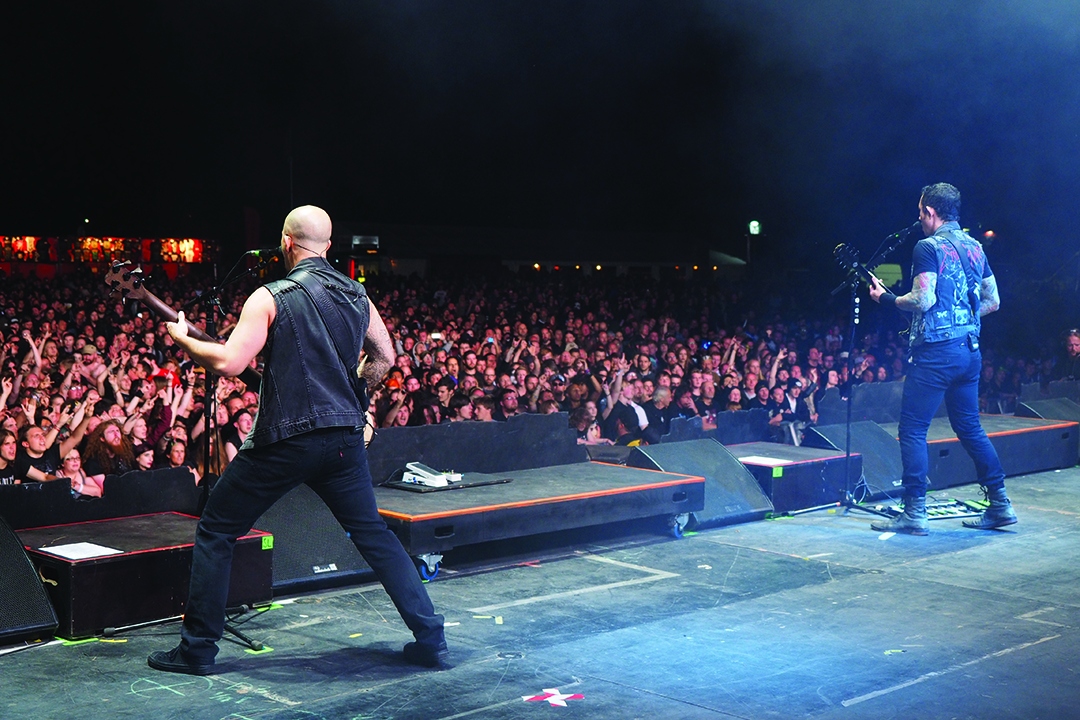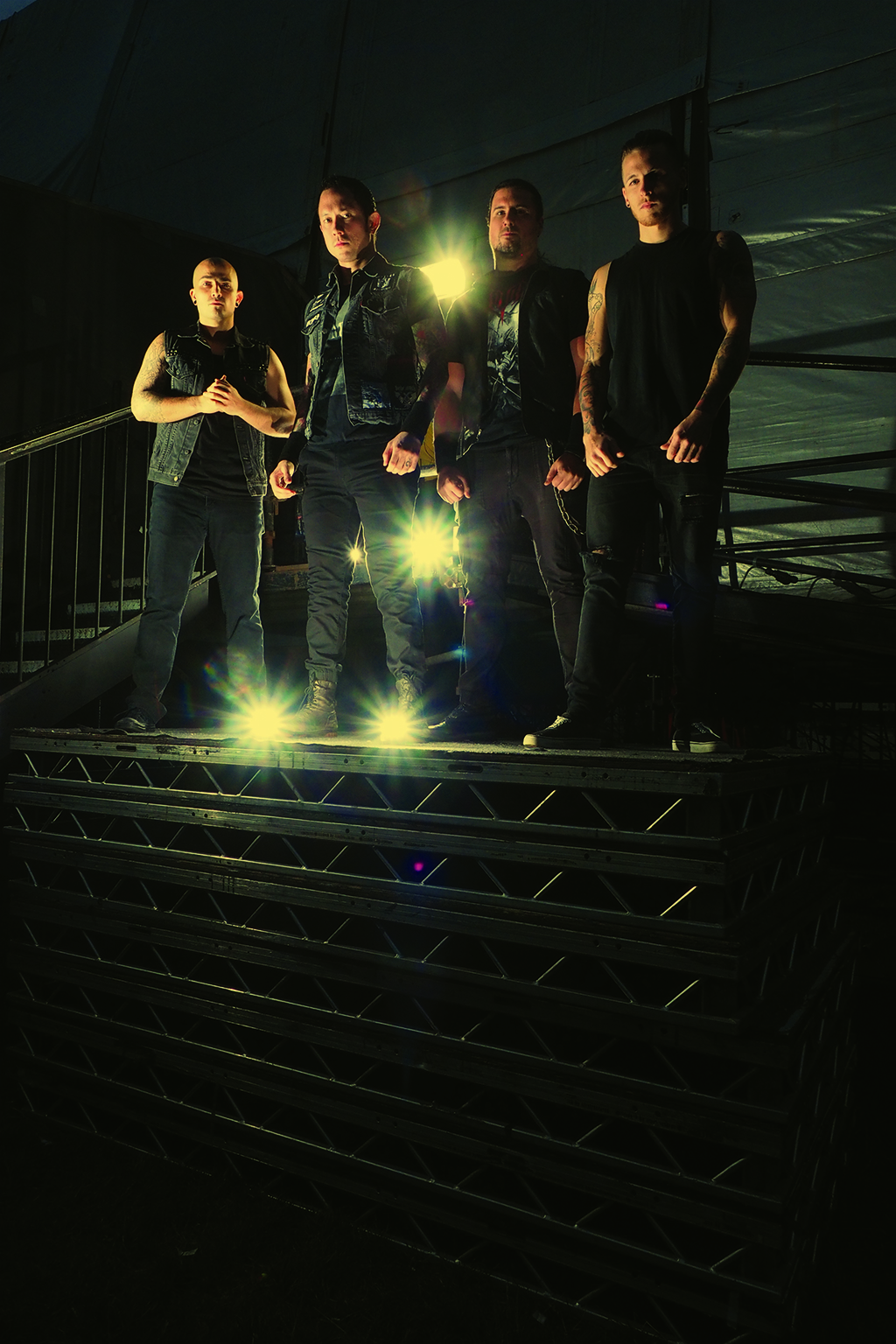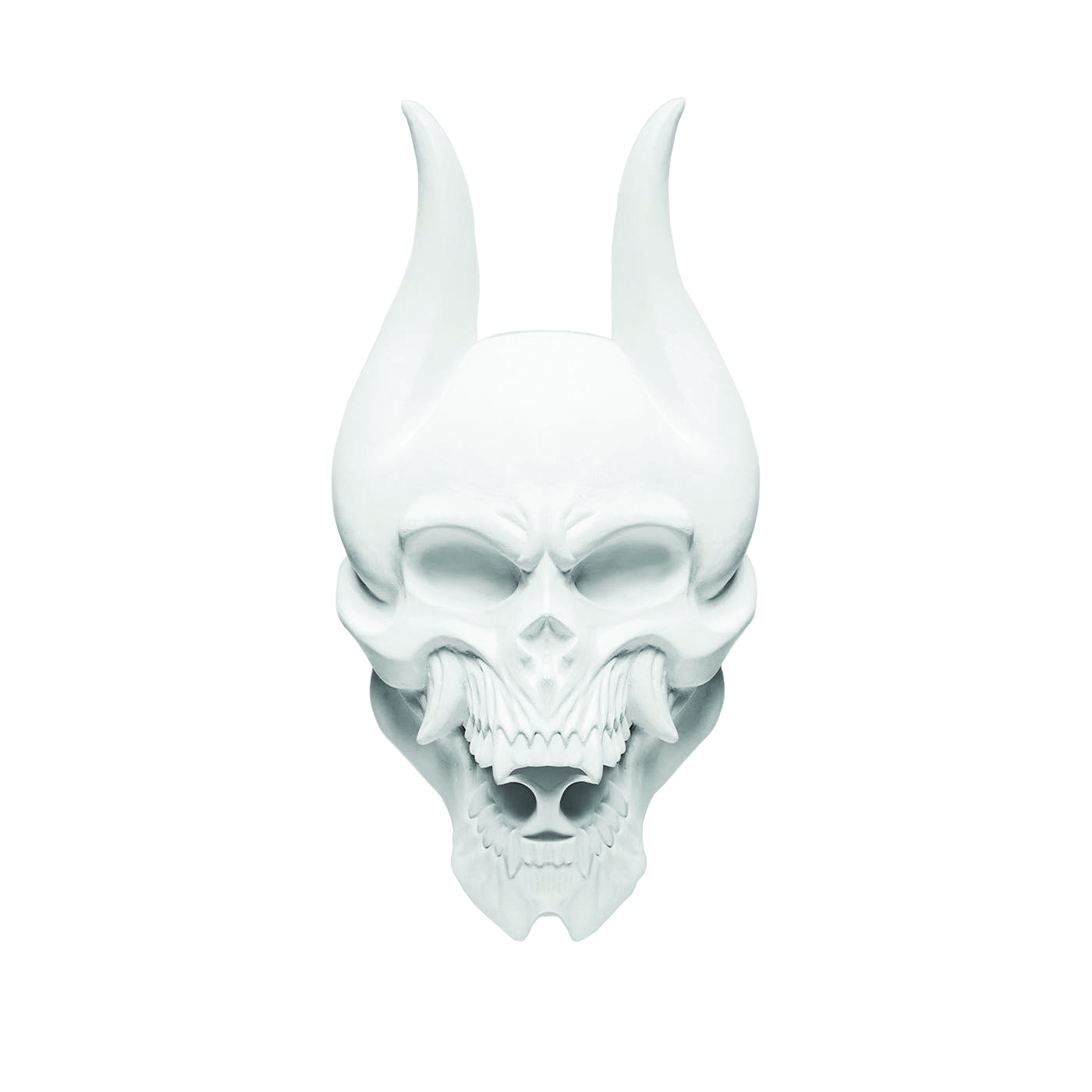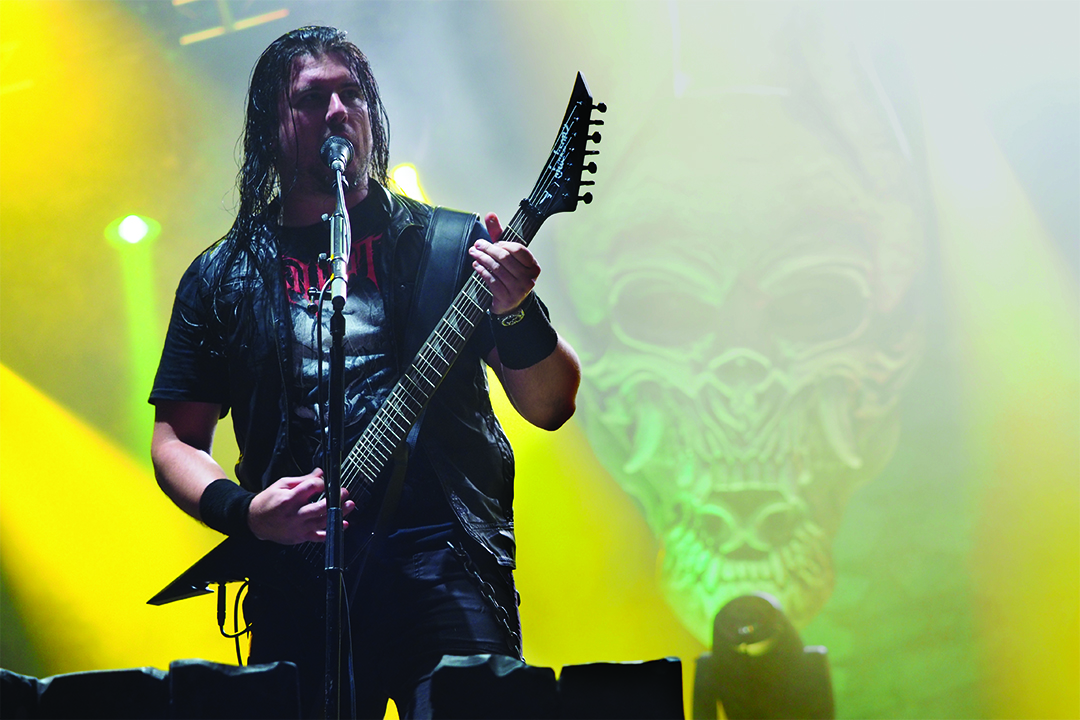The confetti from Sabaton’s tanks settles underfoot, the sun drops, and four men from Florida stride onto Bloodstock’s main stage to take up their position as Friday’s closing band.
As they start up their new album’s title track, Silence In The Snow, the eyes of two ominous skulls flash behind them, CO2 cannons erupt, and they posture triumphantly.
Not only did Bloodstock mark the debut of Trivium’s new sound, it was also their UK festival headlining debut, at an event committed to the metal community. But the appearance had added importance for the four guys onstage – they were playing on the Ronnie James Dio Stage, named in tribute to one of the most legendary figures in the metal pantheon, and their hero. Having played alongside the man himself (in supergroup Heaven & Hell) back in 2007, Trivium had drawn on his influence to create their new classically slanted heavy metal thunder.
“That was a game-changer,” begins frontman Matt Heafy, reflecting on their experiences with Dio. “He was one of the greatest singers I’ve heard in my entire life and, talking to him afterwards, he was so welcoming and kind, making us feel like longtime friends. It inspired each of us immensely, and immediately after that show I started writing Silence In The Snow. But we weren’t ready for a song of its magnitude – and its magnitude was through its simplicity – so we put it away. When we started writing this album, Paolo [Gregoletto, bassist] was like, ‘Let’s bring this song back.’ So we started writing the music around it and seeing what fit. We wanted to learn from the source and the heroes of our heroes – you know, who were bands like In Flames, Slayer and Metallica listening to?”
The answer to that question was icons such as Iron Maiden, Judas Priest, Dio, Rainbow and Black Sabbath. Since breaking through with second album Ascendancy in 2005, Trivium have been steadily moving away from their metalcore and melodic death metal roots, placing greater emphasis on good, old-fashioned metal values. But with Silence In The Snow, the group have made a huge leap, embracing a sound more associated with Europe’s true and power metal movement than with contemporary American metal. Bold and unapologetic, it celebrates a much earlier era while leaving only trace elements of thrash, death metal and metalcore intact. It marks a significant musical shift, even in relation to 2013’s *Vengeance** Falls*. Some circumstantial differences separate the two releases – the replacement of drummer Nick Augusto by former drum tech Mat Madiro, and production from Michael ‘Elvis’ Baskette (Slash, Falling In Reverse, Alter Bridge) rather than Disturbed mainman David Draiman. But most significant seems to have been the sounds that were inspiring the band to write.
“Bringing that song back brought back memories of seeing Heaven & Hell, and made us want to listen to more Dio and Sabbath,” smiles guitarist Corey Beaulieu. “That song sucked us into that era of metal, it seeped inside of us, and the songs just started coming out. We tried to make a record that would make these guys feel pride that they’d helped inspire a new band to try and wave the flag for metal. And the first show we played in, like, a year was headlining Bloodstock on the Ronnie James Dio stage, opening with Silence In The Snow, which had been inspired by seeing him. It was like the stars aligned for one magical moment.”

Another surprisingly stylistic shift on Silence… is Matt’s singing style. When he suffered with vocal problems in May 2014, Trivium were forced to cancel some dates. Understandably shaken by losing one of the main weapons in the band’s arsenal, the frontman was forced to go back to basics, overhauling what he thought he knew about singing. As a result, the new record has no screamed vocals – something that proves striking, even given Trivium’s past efforts.
“A year and three quarters ago, I blew my voice out, and Matt from Avenged Sevenfold texted me and said, ‘I heard you blew your voice out; let me know if I can help.’ That blew me away. I asked him what he did when he hurt his voice. He put me in contact with this singing teacher, Ron Anderson. Ron’s taught Axl Rose, Chris Cornell, Janet Jackson – the list goes on. Not only has he helped my clean singing, but he’s taught me a correct screaming technique, because what I’d been doing for 15 years was incorrect, and I was on the brink of destroying my voice. In the past, singing was such a strain, and screaming would give me headaches and make my lungs hurt and my throat hurt. But I thought that was the way it was supposed to be.”
The band are keen to make clear that the absence of growling on the new album does not necessarily indicate a permanent departure, and that older material will still be delivered the same live. All the same, Matt is not only embracing his new approach, but says it’s something he always wanted to achieve.
“When I started this band, I didn’t want to be the singer, but Travis [Smith, former drummer] said, ‘No, you’re going to be the singer’,” he laughs. “I was 13, he was 17 with a tattoo and bigger than me, and I was scared, so I listened to him. I wanted to be a singer like Bruce Dickinson, Dio or Freddie Mercury, but my voice didn’t work that way – the only thing that worked was screaming. But when we were writing, we didn’t say, ‘There won’t be screaming on this record.’ We said, ‘If it needs screaming, we will use it.’ And it didn’t end up needing it at all.”
“On a creative level, we also wanted to challenge ourselves, to do something we hadn’t done before,” adds Corey. “That doesn’t mean we’re not as heavy or are watered down – we’re just trying to push the boundaries on what we’re capable of doing.”

Corey’s words seem to pre-empt criticisms that will be thrown at the band in the wake of Silence… One wonders if there’s a danger of alienating Trivium fans who were won over by heavier material with at least some growled vocals. Are they worried about shocking people?
“I think every album is a shock, and I love that,” Matt smiles. “The beauty with our band is we never know where we’re going to go next. Ascendancy was very successful, and immediately after [with 2006’s The Crusade] we showed we weren’t afraid to do something completely different, which was still within the spectrum of what we know Trivium to be. And we’re not doing it to be spiteful to the people that support us, we’re doing it to make the sort of music that we want to hear as metal fans. And maybe we’re also subconsciously thinking, ‘What is everyone else doing and what are we doing?’”
“This is 10 years after Ascendancy,” points out Corey. “That record really put us on the map, and we hope this record will be the defining point for the next 10 years. We wanted something that would stand out, just like Ascendancy did 10 years ago.”
Whether Silence… is viewed by history as the beginning of a brave new era for the band or simply a notable sidestep, their ambition is commendable. It’s a trait they’ve always had, and is sometimes interpreted as arrogance, yet drives a punishing and self-testing approach to being in a band.
“The first time we appeared on a magazine cover, we became known for the quote, ‘We’re going to be the next Metallica’,” recalls Matt. “To begin with, people loved that quote. Magazines loved the idea that here are some confident guys who are going to cause a stir. But immediately after that, it seemed like all the bands in the world, our peers, fans, even magazines, hated the fact we did that. And we had to say, ‘Oh, we were cocky and young, we’re just happy playing music, it’s all good.’ And now I feel why would anyone… why should anyone… and why did we feel we needed to apologise for our goals?”
Where Trivium go from here is difficult to predict. Having stepped so freely from one style to another, they’re clearly hesitant to present Silence In The Snow as anything more than Their New Album, and certainly not a new template for the band’s identity. But what’s clear is that it represents a continuing drive to keep achieving, a homecoming of sorts, and an overall celebration of metal values.
“This is us, interpreting what the classics are about, using our tools,” concludes Matt. “Hopefully if people are unaware of Rainbow or Dio or Black Sabbath, us talking about their influence will bring them to people’s attention.”
*Silence In The Snow *is out on October 2 via Roadrunner

Demon Of The Fall
What’s the deal with Trivium’s new Japanese skull mascot?
Seen at Trivium’s live show and on their cover art, their new skull logo is inspired by the story of the samurai Watanabe no Tsuna fighting the demon Ibaraki-dŌji at Rashomon gate.
“He chopped the demon’s arm off, and the demon fled, but years later an old woman visits him and asks to see the arm,” recounts Matt Heafy. “He shows her the arm and she takes it, attaches it to herself, and turns back into the demon and flees, and is never heard of again in Japanese folklore. I wanted to have my tattoo artist – Kahlil Rintye at Tattoo City in San Francisco – come up with a skull logo – a mascot like the Motörhead skull or the Misfits skull – and for it to be the discovered skull of the demon Ibaraki-doji, since no one heard of her again,” he explains.

After Matt’s tattooist drew the skull, a costume maker turned it into actual black, white, bone and metal masks, which is what you see on the album’s artwork.
“Silence In The Snow was written when we were doing shows in Japan, and the title was taken from a Japanese piece featuring two tattooed warriors fighting in the snow,” explains Matt. “Since it’s half of who I am, Japanese imagery is very important to me.”
